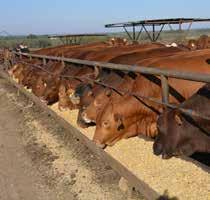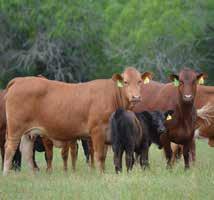
3 minute read
Beefmaster Heterosis Can Impact Any Herd
Beefmaster is a beef breed developed in America that improves beef quality and production efficiency when crossed with any other cattle breed for commercial beef production. The breed originated in Southern Texas in the late 1800’s into the early 1900’s. The Lasater family originally developed a large herd of Hereford cattle carefully selected to withstand the heat and insects of the Texas Gulf Coast region, but they were still not perfectly suited to that difficult environment. So Lasater began to experiment with incorporating Bos indicus or Zebu genetics, in the form of Gyr and Guzerat bulls from India and Nelore from Brazil. While the practice of crossbreeding was virtually unheard of at the time, they immediately saw a tremendous jump in productive traits, such as weight gain and reproductive rates. This is genetic advantage known as heterosis or hybrid vigor. By the early 1930’s, the ranch also incorporated Milking Shorthorn genetics, to augment milk production and carcass quality. They could immediately see that the three-way hybrid was far superior to the two-way crosses. The final composite ended up at roughly 50% Bos indicus and 50% Bos taurus (25% Hereford and 25% Shorthorn). As Lasater developed the breed, he also formed a unique selection phi-
losophy known today as The Lasater Philosophy. The concept is to only select cattle for economically relevant traits, which he distilled to these Six Essential traits. It is the only breed in history to be selected only using pressure for productive traits, as opposed to aesthetics. In 1937, the herd was closed to outside genetics with continued internal development to cull low-performers and upgrade all traits together equally. By 1954 the foundation herd was recognized by USDA under the name of Beefmaster. The breed has rapidly grown around the world and has become known as the prime maternal cow for serious commercial cattlemen that appreciate their production excellence, particularly in harsh desert or tropical environments. The breed has excelled across most regions of the United States and is the leading breed of choice for commercial cattlemen in Mexico, South Africa, Thailand, Panama, Columbia and several other Latin American regions. With global demand for higher-quality beef growing geometrically, Beefmasters provide the perfect breed to cross on commercial cattle to improve production efficiency and carcass quality, while not sacrificing adaptability. Commercial cattlemen have noted

substantial economic gains from using Beefmasters to provide an average increase of 60 lbs., or more at weaning when compared with other breeds. They excel post-weaning as well, with faster weight gains, excellent feed conversion and carcass yields around 64%. In a time when sustainability is becoming increasingly critical, Beefmasters have repeatedly demonstrated that they are highly efficient converters of both forage and feeds into lean, tender, high-quality beef. A recent study at the U.S. Department of Agriculture Meat Animal Research Center (MARC) demonstrated Beefmasters dominance when compared to 18 of the most widely used beef breeds in the United States. Beefmaster Breeders United (BBU) is headquartered in Boerne, Texas. Beefmaster ranks fifth in the U.S. in terms of membership and is the largest of the American breeds. The association has over 3,000 members registering around 19,000 calves annually. Beefmasters also enjoy a rapidly growing international footprint, with established associations in eight countries worldwide. These innovative cattlemen have seen the tremendous strengths Beefmasters bring to their own genetic improvement programs. For more information about what Beefmasters can do for your operation, please visit us www.beefmasters.org. e






